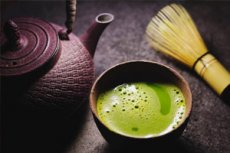New publications
Matcha green tea improves cognitive function and sleep in older adults
Last reviewed: 02.07.2025

All iLive content is medically reviewed or fact checked to ensure as much factual accuracy as possible.
We have strict sourcing guidelines and only link to reputable media sites, academic research institutions and, whenever possible, medically peer reviewed studies. Note that the numbers in parentheses ([1], [2], etc.) are clickable links to these studies.
If you feel that any of our content is inaccurate, out-of-date, or otherwise questionable, please select it and press Ctrl + Enter.

A recent randomized controlled clinical trial published in the journal PLOS ONE found that daily matcha consumption may improve social perception and sleep quality in older adults in the early stages of cognitive decline.
Dementia is one of the most serious neurodegenerative diseases associated with aging worldwide. According to the 2022 report of the World Health Organization, the number of patients with dementia is expected to increase from 57 million in 2019 to 152 million in 2050. Sleep disturbance is another significant problem among older adults, and a decrease in sleep duration from 7 to 6 hours is associated with a 30% increase in the risk of dementia in adults aged 50-60 years.
Lifestyle, including diet, plays an important role in maintaining cognitive function in older adults. Preclinical studies have shown that proper nutrition is important in preventing cognitive decline associated with dementia. Matcha contains several bioactive compounds, such as epigallocatechin gallate (EGCG), theanine, and caffeine, which are known to have positive effects on cognitive function and mood.
The study involved 99 elderly people aged 60 to 85 years living in Japan, of whom 64 had subjective cognitive decline and 35 had mild cognitive impairment. The participants were randomly divided into two groups: an intervention group and a control group. Participants in the intervention group received two grams of matcha daily for 12 months, while the control group received placebo capsules identical in appearance, color, and smell.
Participants' cognitive function and sleep quality were assessed at baseline and after 3, 6, 9 and 12 months.
The study found that the compliance rate of matcha capsules and placebo was 98-99% throughout the study period. Significantly higher blood theanine levels in the matcha group compared to the placebo group also suggested high compliance of the participants to the intervention.
An assessment of facial expression perception in cognitive functions showed that matcha consumption was associated with significant improvements in social cognition, including recognizing facial expressions and describing the meaning of words. However, no significant improvements were found in key cognitive measures such as the Montreal Cognitive Assessment-J (MoCA-J) and the Alzheimer's Disease Assessment-Meditation-Activities of Daily Living (ADCS-MCI-ADL). A positive trend in sleep quality was also noted in participants taking matcha for 12 months.
In a facial expression perception test, participants taking matcha showed a reduction in reaction time and a reduction in the number of false responses compared to the placebo group.
The results of the study suggest that regular matcha consumption may improve emotional processing and sleep quality in older adults with subjective cognitive decline or mild cognitive impairment. However, the lack of significant changes in key cognitive measures suggests that the benefits of matcha may be limited to certain aspects of cognition, such as social acuity, rather than broader cognitive function.
The possible sleep-improving effect of matcha may be explained by its theanine content. Theanine supplementation has previously been shown to be associated with improved sleep quality in both healthy adults and patients with schizophrenia. Given that sleep disturbance significantly increases the risk of developing mild cognitive impairment, improved sleep quality through matcha consumption may be responsible for the observed improvement in social cognition in the intervention group.
However, the results of the study should be interpreted with caution due to certain limitations, such as the relatively small sample size, which may not fully represent the broader population of older adults with cognitive decline. In addition, the use of self-reports to assess sleep quality may not capture all aspects of sleep architecture, and future studies are recommended to use more objective methods, such as polysomnography.
Incorporating matcha into your daily diet may be a simple and effective strategy for improving cognitive function, sleep quality, and preventing dementia.
Further research is needed to fully examine the long-term effects of matcha on cognitive decline, including the use of larger samples, more sensitive neuropsychological tests, and biomarker analysis to better understand the mechanisms by which matcha acts on cognition and sleep.
